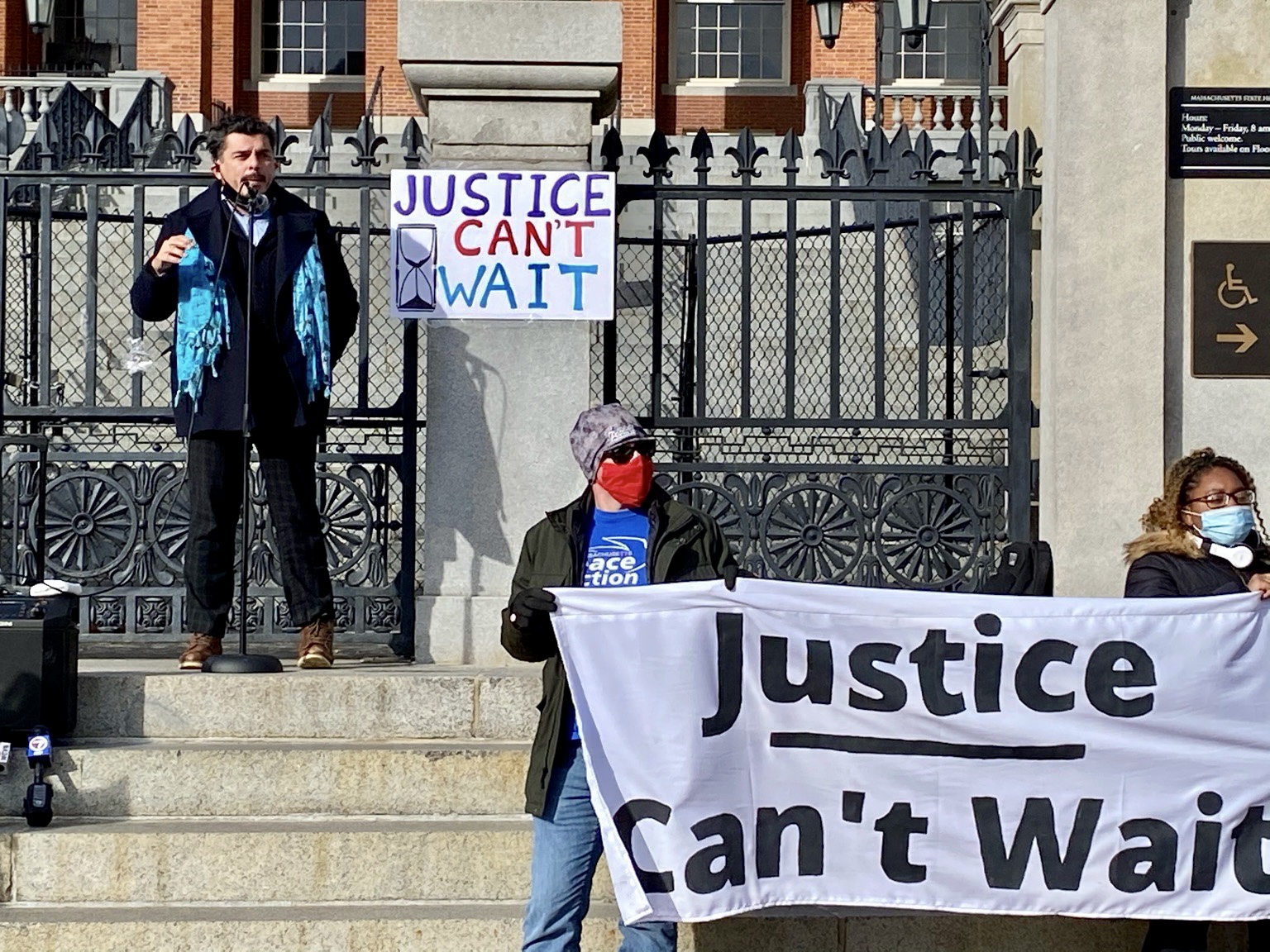latest
MA Coalition calls on legislators to pass bills on evictions, paid sick time, Native American mascots, state flag

BOSTON – Leaders from eight coalitions united on the steps of the State House today to call for action on legislation concerning the Guaranteed Housing Stability Act (S.2918/H.5018), Emergency Paid Sick Time (S.2882/H.4928), Environmental Justice (H.4912, amendment #52) , Safe Communities Act (S.1401/H.3573), Work and Family Mobility Act (S.2061/H.3012), Change the State Flag & Seal (S.1877/H.2776), Prohibit Native American Mascots in Public Schools (S.247), and Protect Native American Heritage (S.1811/H.2948) before the end of this legislative session.
The coalition feels that inaction concerning residents, in particular the poor and minorities, in Massachusetts is causing a disparity and mistreatment.
“Frontline workers need protection and economic support now. People need housing stability now and the looming eviction crisis of 100,000 people being forced from their homes must be prevented. Immigrant families have been relentlessly targeted for the past four years and it would be a failure in Massachusetts leadership to let yet another legislative session pass without action. Environmental Justice is crucial for our communities. The pandemic has exposed the harsh truth that those burdened with the worst air quality are most vulnerable in a public health crisis. And, we join together with Indigenous leaders to end the shame of being the final state that has refused to change its racist flag. How do we call for justice and equity when the very symbol of our Commonwealth is racial oppression?”
“Four hundred years after the Pilgrims landed In Plymouth, it is long past time for Massachusetts to begin to reckon with its racist and damaging history with Native Americans. Indigenous peoples are on the front lines of COVID-19, police brutality, and climate change.”
Leaders of each coalition issued separate comments on the pending legislation.
“Seen from a systemic perspective, Massachusetts Indigenous Legislative Agenda improves confidence between Indigenous peoples and the Commonwealth. From addressing representation in educational environments, council chambers, and courthouses to mitigating harm perpetuated by auctioning sacred objects, our communities demand the dismantling of white supremacy and moving towards a sustainable future,” said Jean-Luc Pierite, President of the North American Indian Center of Boston and a member of United American Indians of New England.
Massachusetts Teachers Association President Merrie Najimy said that legislative action is necessary to ensure adequate funding not only for education and the extra demands being placed on public schools, colleges and universities, but also for programs and services that will keep families healthy and economically secure during the pandemic.
“The Baker administration’s fixation with reopening public school buildings misses the bigger picture of what it takes to meet the academic, social and emotional needs of students – all while keeping everyone safe and healthy,” Najimy said. “Families, too, need additional supports and financial resources as their children participate in remote or hybrid education.
“The pandemic has brought about an unparalleled level of trauma for children and families. Educators are prepared to help our students but cannot do it alone,” she continued. “Public schools need vigorous support from the state so they can be part of a community-wide wraparound approach to helping students and their families overcome the challenges presented by the coronavirus.”
“In the few weeks since the moratorium ended we have already seen 750 eviction notices served in Western MA and nearly 700 foreclosure notices! In court, attorneys and organizers have seen dozens of executions issued and hundreds more are scheduled. Meanwhile, applications for rental assistance have increased exponentially statewide, with processing wait times averaging 4-8 weeks. These are the warning signs of the eviction and foreclosure tsunami. Massachusetts legislators have failed to act meaningfully to protect people hardest hit by covid19. Our one last shot before the federal moratorium ends is to pass the Guaranteed Housing Stability Act before Dec 31. Otherwise homeowners and renters will be left out in the cold on Jan 1st,” said Lisa Owens, Executive Director, City Life Vida Urbana.
“We’re in the middle of the expected fall COVID surge, but there’s still time to act and prevent more hospitalizations and deaths this winter. Tens of thousands of Massachusetts workers have used up their existing paid sick time or never had any to begin with, and they feel financial pressure to go to work even when they might be sick. This amendment for an Emergency Paid Sick Time law would allow workers to stay home and avoid spreading COVID to their coworkers and the public,” said Lew FInfer, Co-Director of MA Communities Action Network.
“We need environmental justice legislation now! Environmental Justice communities across the Commonwealth have been carrying an unjust environmental and public health burden for far too long. We have been sounding the alarms for decades, knowing that our communities would be hardest hit by any disaster, and that is exactly what happened with COVID. The legislation sitting in Conference Committee H.4933 is only one small step in providing basic protection to low income communities, communities of color and communities who experience language isolation. This is about human rights and protecting our most vulnerable communities across the State. In the midst of a public health crisis and the social and economic inequities that have been uncovered by the pandemic, we urge the legislature to enact environmental justice legislation now.” said Maria Belen Power, Associate Executive Director, GreenRoots and co-convener of the Massachusetts Environmental Justice Table.
“The Safe Communities Act would ensure that immigrants have access to police and court protection without fear of family separation. Quick passage is especially critical for immigrant victims and survivors of domestic violence, who are forced to quarantine with their abusers during the pandemic. They are living in a high risk situation due to their fear of contacting law enforcement. This is a public health emergency that the state needs to address right now,” said Gladys Ortiz, Bilingual Court Advocacy Manager & Community Outreach Specialist at REACH Beyond Domestic Violence.
“Simply by allowing every qualified state resident the ability to apply for a driver’s license, regardless of his or her immigration status, the Work and Family Mobility Act addresses systemic injustice and improves the health and safety of every Massachusetts resident. We know that the undocumented immigrants who need these licenses are also mostly people of color, and a disproportionate percentage are essential workers. These 180,000 state residents need to legally drive to avoid clogging public transportation and increasing the pandemic’s spread, and to provide us with the groceries, childcare, elderly care, construction, cleaning and other services on which we all depend. The current state-sanctioned bias against these immigrants has turned driving into a criminal act, rewarding racist police for engaging in racial profiling, and turning the simple act of driving into the second most common criminal charge levied in the state. This cruelty has gone on for far too long. We need to pass the Work and Family Mobility Act now,” said Dalida Rocha, Political Director of 32BJ SEIU and co-chair of the Driving Families Forward Coalition.
“They have decided to forge ahead with planned cuts – amputations to be exact, severing connections to work, family and worship, healthcare, entertainment and safe ways to travel from point a to point b. The MBTA’s ‘Forging Ahead’ plan is rolling us back. Advocates fought to get weekend service on lines like the Fairmont line and next month they plan to vote to take that away,” said Mela Bush-Miles, Transit-Oriented Development Director, Alternatives for Community & Environment (ACE).
-

 Community6 years ago
Community6 years agoNational Shrine of La Salette Festival of Lights 2017 set to begin
-

 Community6 years ago
Community6 years agoMassachusetts State Police looking for good home for retired dogs
-

 Crime6 years ago
Crime6 years agoFall River ranked most dangerous city in Massachusetts according to report
-

 latest6 years ago
latest6 years agoDurfee student allegedly overdoses on marijuana
-

 Community6 years ago
Community6 years agoVideo of Fall River Police goes viral
-

 Causes6 years ago
Causes6 years agoMissing Fall River woman found deceased
-

 Crime6 years ago
Crime6 years agoFall River Police add names to most wanted list
-

 Causes6 years ago
Causes6 years agoFall River teenager reported missing has been found






Liberty
November 19, 2020 at 4:10 pm
Who runs the Mass. Legislature, special interest groups or the people’s elected reps.?
Mortis Maximus
November 19, 2020 at 5:03 pm
This sounds like the rantings of completely unhinged socialist psychopaths.